Master Data Management Vendor Stibo Systems Highlights GenAI Innovation, Sustainability Differentiation
Master Data Management Vendor Stibo Systems Highlights GenAI Innovation, Sustainability Differentiation
Stibo Systems introduces GenAI-powered Product Experience Management offering and advances in managing sustainability and compliance data.
"Better data. Better business. Better world." Stibo Systems CEO Adrian Carr explained this tagline at the company's annual Connect event, held November 14-16 in Madrid, Spain, by explaining the company's customers want to do more than just manage multiple domains of master data (MDM) -- product, customer, supplier, and location. They need better data to work efficiently with partners, to innovate, to become more agile, to drive better business results, and to make progress on sustainability.

Stibo Systems CEO Adrian Carr explains the company’s “Better data. Better Business. Better World.†agenda at the company’s Connect 2023 event in Madrid, Spain.
Day one of Stibo Systems Connect 2023, which was attended by roughly 400 executives, led off with the announcement of Product Experience Management (PXM) Enhanced Content, a new component of the vendor's Stibo Systems Enterprise Platform (STEP). PXM is designed to enable brands to develop content that complements their product data and to deliver it across multiple digital channels at scale.
PXM offers pre-built templates for developing product content, harnessing GenAI, when and where needed, to generate content that doesn't yet exist. That might include product descriptions, product imagery, videos, brochures or multi-language translations. The idea is to speed time to market and improve conversion rates. PXM's enhanced content can be syndicated at scale by manufacturers and/or distributors to retailers to enhance digital sales experiences.

Stibo Systems’ new PXM Enhanced Content offering is designed to help to develop content that complements product data, using GenAI as needed, and deliver it across multiple digital channels at scale.
Better Data
Stibo Systems has more than 540 customers around the globe, almost all of which are enterprise scale (1$ billion-plus-annual-revenue). The customer ranks are led by retailers, manufacturers, distributors and financial services, in that order, and many operate globally, including 14 Fortune 100 companies and 42 Fortune 500 companies. According to Carr, who was appointed CEO in 2021, the majority of customers now use STEP as a cloud service running on Microsoft Azure, although on-premises software remains available and supported.
Not surprisingly, Stibo Systems’ GenAI partner is also Microsoft. Executives said the MDM vendor will help customers become "takers, shapers and/or makers" of generative building on top of Azure OpenAI. Takers might only consume GenAI services via APIs for uses such as improving data quality or validating outputs, such as code. Shapers will fine tune (private) versions of models with their own data to, for example, generate text or images in the context of their own business (the PXM model). Makers will build their own foundation models with full control over labelling and tagging for specific use cases. Stibo Systems advocates having humans in the loop to validate GenAI recommendations, so it demonstrated human-review steps built into PXM, for example.
Non-AI-related enhancements to STEP highlighted at Connect included:
- Improved GitHub integration for better version control;
- Faceted search, optimized authoring and streamlined data entry for Customer, Supplier and Location MDM (features already implemented for product information management).
- A new workflow to invite suppliers to a self-service data-entry experience within Stibo Systems Product Data Exchange (PDX) module.
Better Business
Users of SAP ERP systems where plentiful at Connect, and several customers said they chose Stibo Systems to replace MDM capabilities built into legacy SAP R/3 deployments. One home appliance manufacturing exectuive I spoke to, for example, said his company, one of the largest appliance manfuacturers in the world, is in the process of moving from R/3 to S4/HANA. The executive, who asked to be quoted annonymously, said the firm chose a cloud-based Stibo Systems deployment to support a federated MDM deployment approach. He said the company needed flexibility on where to start MDM initiatives across its many brands, product lines and operations as well as flexibility on who might use the MDM platform across business units and IT. The executive gave a presentation at the event to a packed breakout session on the topic of handling MDM when migrating to S4/HANA. He was not alone among customers in citing flexibility as a differentiator of Stibo Systems’ platform.
CEO Carr told me that about one third of Stibo Systems customers are SAP ERP users, with the balance using other ERP systems. SAP customers were more plentiful at Connect due to this year's European location. The Connect event alternates between European and North America locations and is planned for Orlando, FL, in 2024.
Better World
Another differentiator for Stibo Systems is its depth in addressing data requirements tied to environmental, social and governance (ESG) initiatives and regulations. Sustainability is a front-burner challenge for European companies and global companies doing business in Europe. Interest was sparked long before this year's passage of the European Union Corporate Sustainability Reporting Directive (CSRD). The regulation will kick in for large EU-based and EU-listed companies beginning in 2024 and will apply to many non-EU-based companies doing business in Europe by 2028.

Stibo Systems manages sustainability data as a use case with cross-references to existing master data as well as support for validating sustainability and compliance assessments and certifications.
Stibo Systems is in a good position to benefit as sustainability regulations go global. The International Financial Reporting Standards (IFRS) Foundation is now promoting IFRS-S sustainability disclosure standards to the more than 140 countries that report using the foundations’ standards. IFRS-S was developed by the foundation’s International Sustainability Standards Board. The U.S. won't be far behind, with the U.S. Securities and Exchange Commission poised to introduce regulations as soon as this year that are expected to kick as soon as 2026.
The good news in regulation, if it can be seen as such, is that regulations are expected to be far more consistent and aligned, globally, than the current hodge podge of voluntary frameworks. What's more, the regulations now on the books and those published thus far in draft form have been heavily based on the most widely adopted voluntary frameworks already in use. In short, sustainability leaders will have a big head start on compliance.
For now, Stibo Systems is managing sustainability data as a use case alongside existing master data rather than as a separate domain, but Neda Nia, Stibo Systems’ chief product officer, said it may elevate sustainability as its own domain in future. Stibo Systems executives demonstrated Sustainability Data Cards during the event, showing cross-references to existing domains such as product and supplier data. Functionality also includes sustainability assessments, so a retailer or manufacturer, for example, could assess a supplier or product for its carbon footprint, fair trade practices or fair labor practices.
Using Stibo Systems' Product Data Syndication (PDX) capabilities -- another STEP differentiator -- sustainability certifications and related product logos can be shared upstream and downstream among manufacturers, suppliers and retailers for use in business-to-business and business-to-consumer marketing campaigns and e-commerce experiences.
Constellation's Analysis
Stibo Systems stands out as a best-of-breed MDM vendor in a market in which multiple MDM offerings have been subsumed into broader Integration Platform as a Service offerings. In addition, some organizations are now attempting to address customer data in isolation, using one of the emerging customer data platforms (CDPs).
Many of the Stibo Systems customers I talked to at Connect have mature data-management and governance practices and see efficiencies in taking a multi-domain approach to managing master data, even if they're starting with a single domain, such as product data. They also cited Stibo Systems’ modular deployment flexibility and responsive product development and customer service.
Stibo Systems’ focus and approach is a stark contrast to that of some larger vendors that check every technology box in data management and spread R&D and customer-support investments thinly over a broader set of capabilities. It helps, too, that Stibo Systems is owned by a 57-year-old private foundation -- Stibo Group, based in Aarhus, Denmark -- rather than a cost-squeezing, profit-demanding private equity firm or public stockholders with quarter-to-quarter attention spans. Stibo Systems’ focus is clearly on the long term, as demonstrated by its investments in managing sustainability data.
In our view, enterprise-scale companies should add Stibo Systems to their list of vendors to consider, particularly if they’re after a multi-domain platform with deployment flexibility rather than an all-or-nothing buy-in approach. Data syndication and data sharing services are additional differentiators for Stibo Systems, while its head start on handling sustainability data just might be a part of the better data, better business, better world that leaders are looking to build.
Related reading:
Boomi Steps Up on Automation and AI as Integration Demands Evolve
How Data Catalogs Will Benefit From and Accelerate Generative AI
Constellation ShortListâ„¢ Environmental, Social, and Governance (ESG) Reporting

